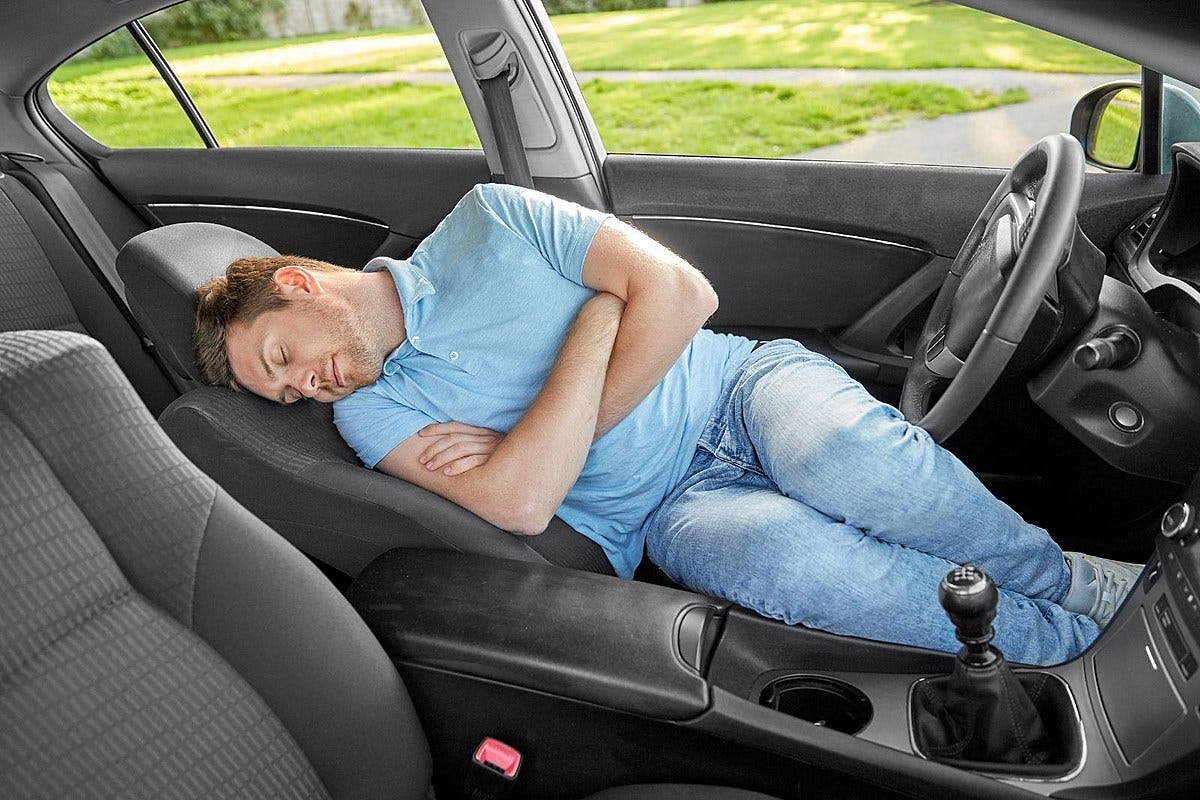Whether you’re a budget-conscious traveler passing through the Sunshine State, or sadly facing housing difficulties, there may be times when sleeping in your car feels like the only option. It’s vital to know the legal landscape in Florida regarding car sleeping to avoid fines, hassles, or worse.
It’s important to note that circumstances matter. Seeking a brief rest during a long drive is different than using your car as a nightly dwelling due to hardship. This article seeks to clarify the legal issues, not address the complex reasons leading to car sleeping.
Florida State Laws and Restrictions
- No Direct Prohibition: Surprisingly, Florida has no statewide law explicitly making it illegal to sleep in your vehicle. This doesn’t mean there aren’t rules you must understand.
- Rest Stop Rules: Florida Department of Transportation rest areas are intended for short breaks in travel. While you won’t be ticketed for a nap, there is usually a 3-hour maximum stay rule to prevent people from using them as overnight lodging.
- DUI Considerations: Even if you’re not driving, being found asleep in your car while intoxicated can land you in serious legal trouble. If you’ve been drinking, it’s wiser to find a designated driver, a safe place to park until sober, or alternative arrangements.
Local Ordinances
This is where it gets complex. Where state laws might be more lenient, individual cities and counties across Florida often have their own ordinances about sleeping in vehicles. These can vary widely:
- Complete Bans: Some municipalities outright prohibit sleeping in cars in any public area.
- Location Restrictions: Others may only ban it in specific zones, such as residential neighborhoods or near beaches.
- “Urban Camping” Ordinances: These target behaviors associated with homelessness and often include bans on sleeping in cars in a broader context.
Where Can You (and Can’t You) Park?
- Rest Areas: A starting point for short-term rest, but mind the time limits and be discreet.
- Private Property: Businesses like Walmart have historically been known for some tolerance of overnight parking, but this is not guaranteed. Always check store policy and be respectful.
- Public Parking: Tread very carefully. Many areas have restrictions on overnight parking, risk of tickets, or safety concerns.
- Campgrounds & RV Parks: These provide facilities but come with a fee. For more extended stays, budgeting for some nights here may be safer.
Staying Safe and Avoiding Trouble
If car sleeping is unavoidable, prioritize safety and minimizing legal problems:
- Be Inconspicuous: Park in less noticeable areas. Use window coverings for privacy.
- Keep It Tidy: A messy car attracts attention. Don’t leave belongings strewn about.
- Move Around: Avoid staying in the same place for multiple nights in a row.
- If Police Approach: Be polite, but understand your rights. You’re usually not obligated to answer questions beyond providing identification.
Resources
- Municipal Codes: Search the websites of cities/counties you’ll be in for ordinances relevant to car sleeping. A good starting point is https://codelibrary.amlegal.com/
- Homeless Support: If you’re facing housing instability, there may be resources to help transition to a more stable situation. Organizations like the National Alliance to End Homelessness (https://endhomelessness.org/) can provide guidance.
Examples of Local Regulations
To make the legal complexity clearer, let’s look at some specific examples of local Florida ordinances:
- Pompano Beach: City ordinances prohibit sleeping in any vehicle between sunset and sunrise on public property without permission (https://codelibrary.amlegal.com/codes/pompanobeach/latest/pompanobeach_fl/0-0-0-85797). This effectively bans car sleeping in most areas.
- Sarasota: This city has strict “urban camping” ordinances. This makes sleeping in cars, along with various other activities in public spaces, illegal, a tactic often used to address perceived issues related to homelessness.
- The Florida Keys: This sought-after tourist destination has ordinances in many areas specifically prohibiting overnight sleeping in vehicles.
Important Note: These are just examples. Always research the specific rules for the locations where you plan to be.
Further Considerations
There are further factors to keep in mind even where car sleeping may technically be legal:
- Vagrancy Laws: While less common than in the past, some places have antiquated “vagrancy” laws. These vaguely written statutes give police power to target individuals without permanent addresses, potentially including those sleeping in cars.
- Trespassing: If you’re on private property without permission, you could be charged with trespassing, even if asleep in your car.
- Practical Concerns: Beyond legality, there are practical safety and hygiene matters. Finding restrooms, maintaining cleanliness, and managing the heat of Florida weather are challenges to consider.
Alternatives to Car Sleeping
If at all feasible, exploring alternatives to car sleeping is prudent, both for legal and wellbeing reasons.
- Budget Motels: Sometimes very basic, but they provide a roof and a bed.
- Couch Surfing: If you have friends or family willing, even short-term stays can help get you back on your feet.
- Shelters: While not ideal, these can be lifelines in emergencies or for those in transition.
- Low-Cost Campgrounds: Some state parks or private campgrounds may have rates only slightly higher than free parking, but offer far better facilities.
Conclusion
Navigating the rules around sleeping in your car in Florida demands careful attention. There are no simple statewide answers. A combination of researching local ordinances, choosing parking locations strategically, and acting discreetly minimizes your risk of legal trouble.
If prolonged car sleeping seems unavoidable, prioritizing your safety and seeking out resources should go hand-in-hand with respecting the law.
Sources
- Meldon Law (Fort Lauderdale Attorney): https://www.meldonlaw.com/fort-lauderdale/dui-defense-lawyer/sleeping-in-car/
- Direct Auto Insurance: https://www.directauto.com/learning-center/driving-laws-and-safety/where-why-its-illegal-to-sleep-in-your-car
- Pumphrey Law Firm: https://www.pumphreylawfirm.com/blog/is-it-illegal-to-sleep-in-your-car/
Disclaimer: This article provides legal information, not legal advice. If you have specific questions about your situation, always consult with a qualified attorney.



